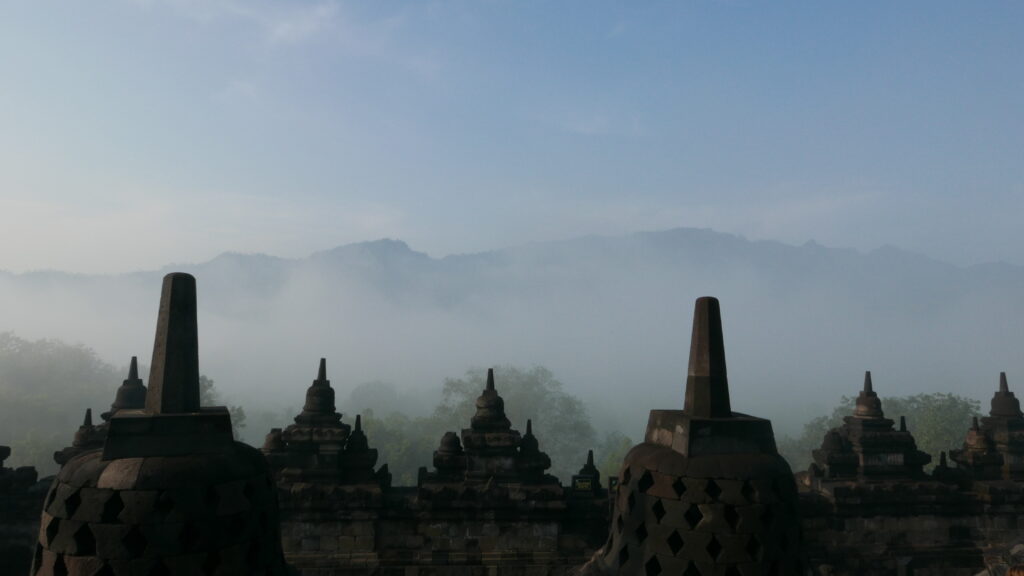“Indonesian music was always there” – Conversation between Yngel and Rully Shabara

Text and photo by Taus Bregnhøj-Olesen and Emil Palme
YNGEL: Where do you find inspiration and is it somehow connected to any specific Indonesian affiliation?
RULLY SHABARA: “No, not any specific Indonesian, but I live here so of course I get inspiration from here. Not necessarily from Indonesian music specifically. The inspiration could be from anything in Indonesia, it doesn’t have to be music, it could be sound or how people culturally interact, or different mindsets in Indonesia. All these factors also shape you and when you have perceptions, perspectives, ideas and ideologies or ideals in you as a person. If you are an artist or a musician, automatically when you try to make something honest with your music, all these ideals, ideologies and perspectives will be put in to your work, no matter if you do it intentionally or not. But if you try to make music honestly and not trying to be someone else, then new things can come up. That’s why the very important thing for me, when I make music, is really just to be honest.”
RULLY SHABARA: “It’s a cliché, but it’s true you have to be honest, I mean not trying to be somebody else. Of course everybody, everybody starts by trying to be somebody else, their idols or something that influence them as a musician at first. But you can not do that forever. At some point you have to realise that you need to be better than your influences, idols or whatever you want to be … you have to be better than that.”
YNGEL: It seems like Indonesia is getting more and more famous for it’s experimental music scene. Do you think there is a reason why the world suddenly looks at Indonesia for new music?
RULLY SHABARA: “Well I have to correct you on that. It’s not new music. Indonesian music is not new music, okay?”
YNGEL: Ah okay.
RULLY SHABARA: “Indonesian music is always there, you know. It has just been undermined. People have been too focused on making music according to western norms. Like classical music, western classical music I mean. And then rock’n roll. Rock’n roll is a huge influence to musicians all over the world, especially in Indonesia. Because when they grow up with rock’n roll or western classical music if they are academics, then when they make music, it’s sometimes detached from the Indonesia’ness. Because they want to be rock’n roll, or they want to be very Mozart.”
YNGEL: For us being musicians traveling here, doing collaborations, it seems like more young Indonesians get inspired by doing something different with the music and get curious to explore their own interpretations of contemporary music.
RULLY SHABARA: “I think that the scene in Indonesia, I talk about the scene, not music, the scene in Indonesia is relatively recent. Not like the west, which already existed since, I don’t know, since the 50s, 40s maybe even before, you know what I mean? It is there [the western scene, ed.], but here the scene itself is recent. So for the western perspective the [Indonesian, ed.] scene is very fresh.”
RULLY SHABARA: “You see all these musician striving to show themselves to the world. Its very fresh, its very pure and very honest in a way and because of that it is interesting seen from a western perspective. Basically because the western music have been explored so many times over, that there is almost nothing left, everybody have done things with western music. They have been experimenting with it so many times over. Whatever weird thing you can think of from western music, I believe somebody have done it in some way. There is nothing fresh, so they will keep looking for inspirations, for sources of inspiration. And when they come to Asia or when somebody listening to Asian music, somebody who was never exposed to that, imagine how exotic it is, how different it is. Because the scale is different, the way we use the count is different, instruments are different, the way we sing is different, the kind of voice we use is different, everything is different.”
YNGEL: You mentioned that almost everything is already done in western contemporary music. Does the Indonesian experimental scene also consider themselves as a new movement or is it only like that seen from a western perspective?
RULLY SHABARA: “It depends on what kind of scene. Are we only talking about the experimental music scene?”
YNGEL: Yes.
RULLY SHABARA: “Of course it is new for us as well. That’s what I’m dealing with. I’m educating people, I make these events to educate to introduce them to make music on the spot. It’s a very unusual concept sometimes for most people. So I also introduce this: ‘Look, there are many ways to compose, or to make music, or to perform music. And instruments. So many ones. And so many ways. You can play traditional music with, I don’t know… mix it with noise or something like that. It’s all possible!”
– Listen to the cooperation between Yngel and Rully Shabara “Yngel, Indonesia” on abstract tits & Insuala Music here.
